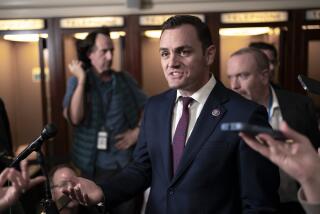Court Rejects Chappell Election Challenge
- Share via
WASHINGTON — Rep. Bill Chappell Jr. (D-Fla.) Wednesday became the first victim of the massive Pentagon fraud investigation, weeks before any indictments are expected in the case, when the Florida Supreme Court rejected his last-ditch electoral challenge to invalidate some 11,000 ballots and keep his congressional seat.
The court action cleared the way for formal certification of November election returns showing that Chappell, who has come under fire for his close ties to several defense industry figures in the probe, had lost his race to a little-known Republican opponent by 732 votes.
Chappell’s defeat was a stunning setback for the 20-year House veteran who heads one of the most powerful defense subcommittees in Congress and who only six months ago was considered politically invincible in his district, even by Republicans.
Craig T. James, a Deland attorney who beat Chappell, said that his opponent’s “coziness with defense contractors . . . and very bad judgment” led to his defeat, even though he pumped more than $1 million into his campaign and outspent James nearly 3 to 1.
“It was just a question of bringing this information to the people’s attention; this kind of stuff had been going on for a long time,” said James, who waged a long-shot campaign that cited press revelations about the congressman’s links to several contractors, including some who brought business to his district.
Justice Department officials recently indicated that they expect the first indictments in the landmark two-year defense procurement probe to be returned by early next year, naming middle-level government officials, corporations and consultants who allegedly trafficked in confidential information on Pentagon contracts.
However, the timetable has slipped repeatedly as the complex fraud cases have proven much more difficult to document than prosecutors initially believed.
Chappell, 66, who officials say has not been implicated in criminal wrongdoing in the investigation, said Wednesday in a prepared statement that he has not decided whether to continue efforts to keep his seat. His challenge, thrown out by the court, was based on 11,000 ballots he contended were improperly counted.
“We are disappointed in the court’s ruling today and now await the court’s opinion (not yet issued) which is expected soon,” Chappell said. “Upon consideration of the court’s opinion, with counsel, I will make a further statement.”
The veteran congressman refused to comment on the impact the Pentagon fraud inquiry may have had on his campaign. He has dismissed suggestions of possible impropriety as “a bunch of bunk.”
As chairman of the House Appropriations Committee’s defense appropriations subcommittee, Chappell wielded influence over U.S. military spending and played a role in drawing up the Pentagon budget. Publicity about Chappell’s close relationships with companies and consultants promoting defense projects proved to be his undoing at the ballot box, James said.
Last summer, Chappell was stung by press reports that two Chappell friends who were defense lobbyists representing Martin Marietta Corp. and Oshkosh Trucks Inc. bought the congressman’s interest in a debt-ridden Ocala, Fla., health club that was in foreclosure proceedings. The two lobbyists sold the property 14 months later to Martin Marietta and made a $25,000 profit. Chappell said that he did not make a profit on the deal and had done nothing improper.
Chappell’s name emerged in the Pentagon fraud inquiry when a defense lobbyist being wiretapped by federal investigators mentioned him in a telephone conversation with a defense industry executive. In the call, federal officials confirmed, the lobbyist for Unisys Corp. suggested that the executive’s company would receive favorable action on a weapons contract if a $5,000 donation were made to a charity golf tournament organized in Chappell’s name.
There was no evidence that Chappell asked Unisys to seek such contributions, but James attacked the fund raising as “evidence of impropriety” in a $140,000 television advertising campaign during the last two weeks of the election.
More to Read
Sign up for Essential California
The most important California stories and recommendations in your inbox every morning.
You may occasionally receive promotional content from the Los Angeles Times.













